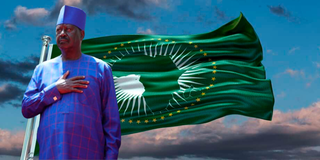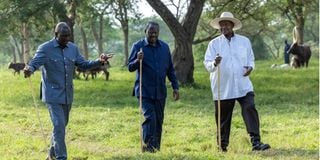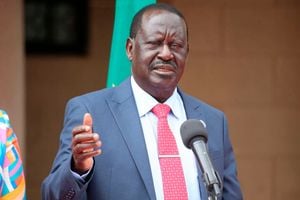
Raila Odinga’s candidacy for the AUC chairmanship could redefine his legacy.
Former Prime Minister of Kenya Raila Amolo Odinga this week formally set his eyes on the chairmanship of the African Union Commission (AUC). A veteran of Kenyan politics, this AU contest, however, will be an ultimate test of political resilience, astuteness and art of skillfully navigating through turbulent politics. Indeed, many opine that the AU elections could be the closing political event in Raila’s political career.
The polls for the AUC chairperson, and other commissioners, are slated for early 2025 following end of the term of the incumbent, Chadian Moussa Faki Mahamat.
In a joint press briefing with Raila Prime Cabinet Secretary Musalia Mudavadi,who is also the Cabinet Secretary for Foreign and Diaspora Affairs, said Kenya has formally submitted requisite documentation of its nominee for the African Union Commission chairmanship.
Yet still, Raila’s candidature is not a marathon race. It will be a steeplechase with hurdles and water pools to navigate. This obstacle course includes the advanced age of Kenya’s candidate, divided reactions from Kenya’s populace on Raila’s bid, the country’s position on divisive geopolitical tensions in Africa, the composition and calibre of Raila’s campaign team, matters of friction, power plays and coordination between the candidate’s team and the government bureaucrats managing the much-needed resources and logistics.
At 79, Raila could be considered advanced in age. However, he has stated and demonstrated that age is simply a number, and his mind and brilliance are intact. Instead, his age has come with wisdom, experience and political resilience necessary for Africa’s transformation.
But, perhaps most important, is that his age and political clout will enable him to effectively engage the African high-level leadership as peers. Contrariwise, given his age, this could be the last major political bid of Raila in case he goes for the two terms that aggregate to eight years at the helm of AUC.
Yet, we should be cognisant of the fact that the chairperson of the commission is the chief executive officer, legal representative of the AU and the AU chairperson’s chief accounting officer. This will require full engagement and even absolute focus on continental matters by Raila. The spill of Kenya’s local politics into the AUC contest could be a double-edged sword. Political decibels indicate that Kenya’s choice of Raila Odinga as AUC candidate was to remove him from the domestic politics equation, ease opposition pressure on the government and enable President William Ruto to craft his 2027 second term bid.
However, Kenya’s former Prime Minister has explained that the genesis of his candidature was actually, a personal initiative based on the prodding by his global networks that include former and serving statesmen. They asked Raila to consider the AUC position once the term of the incumbent ends.
It is true that due to his decades-long illustrious political career, Raila Odinga has emerged as a Pan-Africanist with a huge political network in Africa and globally. Unlike the other candidates, Raila needs no introductions to the African leaders both in government and opposition including the Pan-African masses on the continent. This can also be attributed to having inherited the name and African political networks of his father Oginga Odinga, Kenya’s first vice president and a consummate freedom fighter and Pan-Africanist.
On the choice of the candidate, the government has explained that Raila stepped forward and was found suitable as per the laid down parameters of the AU. According to former Nigerian President Obasanjo, President Ruto and Raila had private meetings over national unity and cohesion of Kenya. The Raila candidature sits well with the ongoing broad-based government meant to achieve unity, equity, inclusivity, transformation and prosperity for all Kenyans.
As a global leader, Raila’s acceptance of Kenya’s broad-based government has sent a message to Africa and the world that he is a statesman who is ready to sacrifice his personal ambitions for the sake of stability, unity, peace and security of the country. This is not the first time Raila has avoided exploiting national unrest for political gains but instead chosen dialogue to pull back the nation from the brink of ruinous upheaval. So, the geopolitical optics is that if Raila is a peacemaker at home, then he can astutely navigate the demands for peace and security in Africa.
Similarly, the divided reactions from Kenya’s populace on Raila’s candidacy is another hurdle in the race. The social media indicates lack of a united front and collective public support for Raila’s candidacy.
A section of Kenyans have even gone ahead to declare supposed solidarity with Raila’s opponents from neighbouring countries. This, indeed, is linked to the decision by Raila to go soft on President Ruto’s government following youth-led protests that bordered on cataclysm for the government. Notably, the close competitors of Kenya’s candidacy for AUC headship have occasionally used social media comments by some Kenyans to promote their candidates and as a counter-campaign strategy against Raila.

President William Ruto (left), opposition leader Raila Odinga and Uganda's President Yoweri Museveni in Kisozi, Uganda, on February 26, 2024.
Additionally, there are certain sticky issues on the continent that may blight Raila’s chances depending on how the government of Kenya approaches them. The geopolitical question of Sahrawi Arab Democratic Republic (SADR) simply known as Western Sahara, Morocco and Algeria requires a delicate diplomatic balance and foreign policy wisdom.
Kenya should have a clearly articulated position on the SADR-Morocco conflict. Morocco has gradually gained geopolitical traction since it rejoined the AU in 2017, challenging Algeria’s (ally of SADR) long-held position in African realpolitik.
Also, the poignant question of Palestine has become one of the measures of Pan-Africanism, respect for human rights and adherence to a rules-based international order.
Here, Kenya has to remain as close as possible to the AU and UN position. The Rwanda-DRC conflict and the Somalia-Ethiopia feud are other geopolitical stresses that Kenya needs to approach with strategic ambiguity if not neutrality, or clearly articulate where it stands. Let the chips fall where they may.
Though not yet manifested, power-plays and coordination challenges between the candidate’s personal team and the government bureaucrats that are managing the much-needed resources and logistics could be a sturbborn node of disjointed campaigns.
Even though it is apparent that the Prime Cabinet Secretary Musalia is in charge of the broad process, there are grumbles from the Raila team on how the mandarins at the Foreign Affairs department have not satisfactorily responded to their urgent logistical needs. There is bound to be friction and jostling especially given that the bid requires huge resources.
However, the best campaign approach is for the government to take charge and harmonise the plans of action or roadmaps by the two sides (government and raila team) to avoid running parallel campaigns.
This brings us to the incongruent issue of the composition and calibre of Raila’s campaign team. The candidate’s team is yet to be officially unveiled, however, going by the interim group actively featuring in Raila’s AUC campaigns, there are some gaps in terms of relevant skills, professional touch in international relations, critical geopolitics and in-depth understanding of the workings of the AU.
There is a need to tap into the pool of former ambassadors, especially to the AU or Ethiopia, and engage diplomats or former envoys who were performers, exceptionally innovative and successful during their tenure in African postings. The choice of campaign team has an implication on what African leaders think will be Raila’s ‘cabinet of the chairperson’ of AUC as is called at the AU.
In his application Raila has outlined his vision for the AUC including African integration and infrastructure development, the economic transformation of the continent, enhancing intra-African trade, financial independence, agricultural transformation, climate action, peace and security, youth empowerment, and gender equity and equality.
Still, going forward, the candidate needs to start addressing the African audience by highlighting challenges that common African masses face such as hunger, violent conflicts, immigration, small and medium-scale trade, roads, education, transnational pandemics and infectious diseases like Covid-19, Mpox, Ebola, and youth unemployment among others.
Perhaps, the complex lexicons of climate financing, gender mainstreaming and human rights could not rapidly give impetus to the Pan-African posture, which is a key strength of Raila.
In sum, Kenya’s candidate should endeavour to put the AU in the hands of the people of the African continent. His messaging should assure the African citizens that he will make the AU work for them. In this way, Africans can sacrifice to support the AU and in turn, member states will have it easy to fundraise or budget for the AU without domestic resistance.
Raila Odinga is evidently the front runner. He is riding on his continental and global networks as well as the backing of his country which is considered a core State in the region and has strategic global ties.
Kenya is relatively resourceful, it has over 23 diplomatic Missions in Africa compared for instance, with Djibouti which has eight embassies on the continent.
However, bottomline, Raila’s and Kenya’s concern should be how to garner the 34 threshhold votes in the first round.
Nasong’o Muliro Wilfred is a Foreign Policy and Security Specialist and Lecturer in Kenyan Universities.







